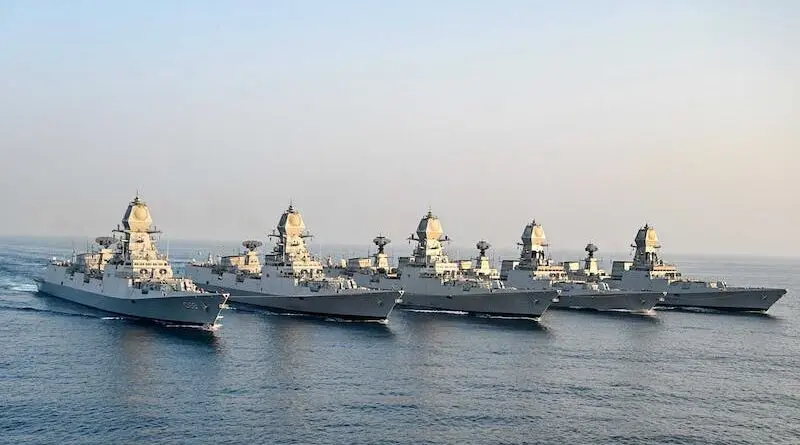India Enhances Naval Diplomacy With Africa: Launches Ambitious Maritime Initiatives – Analysis
India’s naval diplomacy in Africa is entering a dynamic new phase with the launch of two ambitious initiatives—the Africa-India Key Maritime Engagement (AIKEYME) exercise and the Indian Ocean Ship (IOS) Sagar mission. Scheduled for mid-April 2025, these initiatives mark a strategic expansion of India’s maritime footprint in the Indian Ocean, reflecting its broader geopolitical strategy encapsulated in the SAGAR (Security and Growth for All in the Region) and the recently articulated MAHASAGAR (Mutual and Holistic Advancement for Security and Growth Across Regions) visions.
AIKEYME, a major naval exercise co-hosted by India and Tanzania, will occur from April 13 to 18, 2025, off the coast of Dar es Salaam. Ten African nations—Tanzania, Comoros, Djibouti, Eritrea, Kenya, Madagascar, Mauritius, Mozambique, Seychelles, and South Africa—will participate, reflecting a significant gathering of naval strength in a region critically important for global trade and security. These countries are strategically positioned along vital maritime routes prone to security threats such as piracy, illegal fishing, and trafficking. Notably, Djibouti hosts China’s first overseas military base, highlighting the broader geopolitical implications of this naval exercise.
AIKEYME’s carefully structured format includes both harbour and sea phases. The harbour phase comprises tabletop and command-post exercises focused on anti-piracy strategies and information-sharing protocols, complemented by practical training in seamanship and Visit, Board, Search, and Seizure (VBSS) operations. The subsequent sea phase emphasizes hands-on drills in seamanship, search and rescue missions, VBSS exercises, small-arms firing, and helicopter operations, aiming to significantly enhance interoperability and coordination among the participating nations.
Parallel to AIKEYME, the Indian Navy has introduced the IOS Sagar initiative, deploying the offshore patrol vessel INS Sunayna from April 15 to May 8, 2025, staffed by an unprecedented joint crew comprising 44 personnel from nine partner countries: Comoros, Kenya, Madagascar, Maldives, Mauritius, Mozambique, Seychelles, Sri Lanka, and South Africa. This multinational crew will conduct extensive joint surveillance operations across exclusive economic zones (EEZs), with port visits to Dar-es-Salaam, Nacala, Port Louis, Port Victoria, and Malé. This initiative exemplifies India’s innovative approach to maritime diplomacy, combining operational cooperation with capacity-building and technical training.
These naval initiatives are deeply embedded within India’s strategic response to China’s growing presence in Africa, where Beijing has steadily expanded its influence through significant investments in maritime infrastructure, surveillance operations, and fisheries. China’s naval facility in Djibouti and expanded maritime engagements have intensified competition in the Indian Ocean, prompting India to strengthen its strategic alliances through tangible security partnerships.
India’s maritime outreach to Africa also complements its burgeoning role as a defence exporter. The Indian Navy’s efforts in capacity-building, supported by defence technology transfers and naval hardware exports, position India as a credible partner offering sustainable alternatives to African nations wary of China’s often debt-driven infrastructure investments. Although precise export figures specific to Africa remain undisclosed, India’s overall trajectory as a defence exporter is notably upward.
Recent diplomatic engagements, including Prime Minister Narendra Modi’s March 2025 visit to Mauritius and initiatives such as the India-Africa Defence Dialogue (IADD), reinforce India’s commitment to deepening maritime ties. These interactions emphasize maritime security cooperation, counter-terrorism, and joint capacity-building efforts. India’s strategic investments—such as coastal surveillance radar installations in Mauritius and Seychelles—further underline its long-term dedication to regional security and stability.
To further strengthen India’s diplomatic engagement, enhancing coordination and resource allocation within India’s maritime diplomacy framework will be vital for sustaining momentum in maritime cooperation. Recognising this opportunity, defence analysts from institutions like the Manohar Parrikar IDSA emphasise the importance of continuous strategic engagements, regular naval exercises, and technology transfers. Leveraging India’s vibrant private sector is also seen as a significant advantage, enabling deeper regional stability and fostering long-term economic development in Africa.
Looking ahead, India plans to expand AIKEYME to include West African nations, reflecting a holistic vision for maritime cooperation across the continent. This evolution from diplomatic outreach to strategic maritime cooperation spotlights India’s ambitions not merely as a regional power but as a proactive global partner in maritime security.
The AIKEYME exercise and IOS Sagar initiative symbolise India’s strategic shift toward deeper maritime engagement with Africa. These actions, embedded within broader geopolitical frameworks, represent India’s comprehensive response to emerging security challenges and assert its vision of collaborative growth and stability across the Indian Ocean region.

